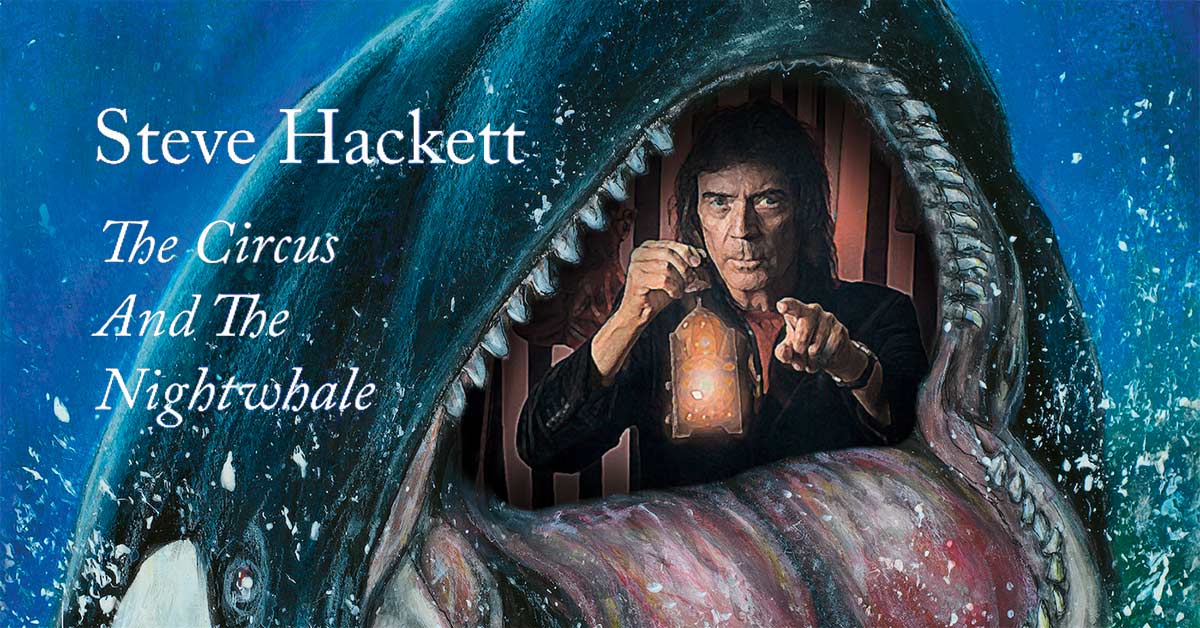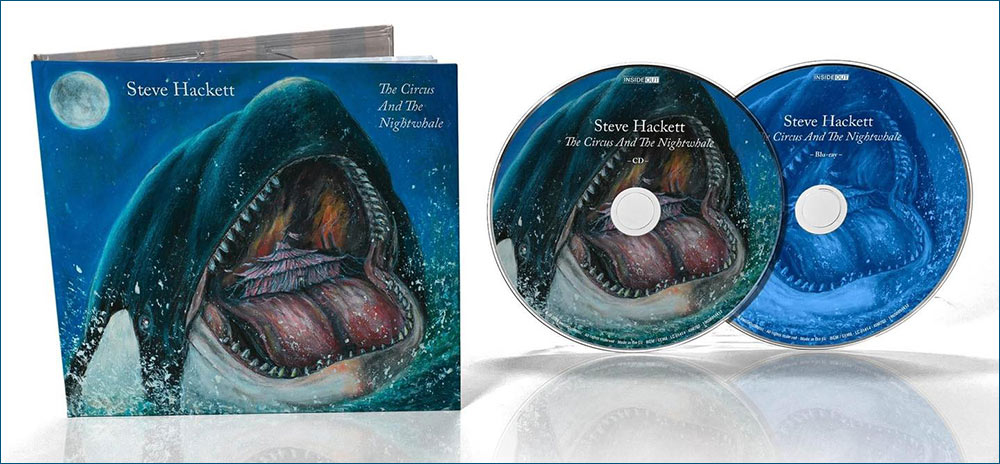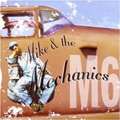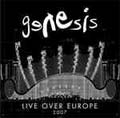


It is the cry of an infant, turned into music that gets things rolling at the beginning. As if on cue, a steam locomotive starts moving, and the journey through life of the main character with the evocative name Travla takes its sonorous course.
He had expressed something that he had wanted to say for a long time, Steve Hackett announced in the run-up to his latest release. And of course, behind the character of Travla is none other than the guitarist and singer himself, who is celebrating his 74th birthday these days. The Circus And The Nightwhale is a retrospective of his own life transformed into music and fiction.
A concept album then. Which, with a total running time of approx. 45 minutes, can be considered quite compact. Wait: an LP-length concept album? The mind wanders back to 1975, when Hackett presented a sequence of songs on his solo debut Voyage Of The Acolyte, each track of which was assigned to a tarot card and formed an episodic journey of the protagonist seeking knowledge and finding love.
 Almost 50 years later, there is no esoteric vibe in the first half of The Circus And The Nightwhale. A montage of supposedly authentic radio snippets is played at the beginning: We find ourselves in 1950s England. Travla plunges headlong into a noisy, polluted and often frightening post-war London. As the story unfolds, we are first introduced to formative childhood and adolescent experiences - from dubious friendships to amorous desires, funfair frenzy and entry into dodgy nightlife.
Almost 50 years later, there is no esoteric vibe in the first half of The Circus And The Nightwhale. A montage of supposedly authentic radio snippets is played at the beginning: We find ourselves in 1950s England. Travla plunges headlong into a noisy, polluted and often frightening post-war London. As the story unfolds, we are first introduced to formative childhood and adolescent experiences - from dubious friendships to amorous desires, funfair frenzy and entry into dodgy nightlife.
In the opener People Of The Smoke in particular, a whole series of clear references to Hackett's life can be recognised, which are highly condensed and very associative. The ex-Genesis guitarist was born in London in 1950 and spent his childhood in the immediate vicinity of Battersea Power Station (the power station on the Pink Floyd Animals cover), the emissions of which shrouded the surrounding neighbourhoods in darkening smog.
Travla's primal sound, which becomes the sound, the initial musical spark of the album, can also be understood as a symbolic realisation of what Hackett writes about his early life in his autobiography A Genesis In My Bed: He was initially a real screaming child, endowed from the start with a great urge to move and a desire to discover. At the age of two, he was given a harmonica, which awakened his fascination with his own musical sound and, from today's perspective, was the first step towards becoming an artist.
The tempo and the density of events on People Of The Smoke set the basic rhythm of the album, which develops an entertaining and varied flow. Many tracks merge into one another and could hardly stand on their own. Some of them end with a short but independent instrumental passage with a retarding effect - as a preparatory change of lighting for what follows. In this respect, The Circus And The Nightwhale is something special, and not just with regard to Hackett's last solo albums: such a special flow cannot be found elsewhere in his entire discography.
 However, there is also a lot of the expected. Hackett-style hard rock, bluesy and sweet romanticism between catchy and kitschy. The maestro's guitar playing, which takes centre stage, is unmistakable, but melodically almost inexhaustible. His lead vocals, a clear weak point of earlier decades, are, as on the last albums, so skilfully produced that they have an acceptable musical presence. The latter also applies to the usual polyphonic vocals, but these once again sound so technically smooth that naturalness and liveliness fall by the wayside.
However, there is also a lot of the expected. Hackett-style hard rock, bluesy and sweet romanticism between catchy and kitschy. The maestro's guitar playing, which takes centre stage, is unmistakable, but melodically almost inexhaustible. His lead vocals, a clear weak point of earlier decades, are, as on the last albums, so skilfully produced that they have an acceptable musical presence. The latter also applies to the usual polyphonic vocals, but these once again sound so technically smooth that naturalness and liveliness fall by the wayside.
The list of those involved in the studio also contains no major surprises. Hackett essentially reverts to his current live band, joined by familiar faces such as his brother John Hackett, Amanda Lehmann and the two drummers Nick D'Virgilio and Hugo Degenhardt. Compared to many previous albums, the drumming in particular seems a little more exuberant and dynamic, which is audibly good for The Circus And The Nightwhale.
However, there is little opportunity for truly differentiated playing in terms of sound.
Keyboardist, programmer, co-songwriter and co-producer Roger King is once again particularly influential on The Circus And The Nightwhale, as he creates his usual opulent and often expansive arrangements. On the positive side, the palette of his sounds is quite broad. In addition to fat organs, piano sounds and King's typical string orchestra imitations (which never quite get rid of their plasticity), more previously unheard synthesiser colours are fortunately also used. Nonetheless, at one point or another, one would wish for a less-but-worth-it.
Any real musical highlights on the album? Rather not.
Taking You Down is a wide-legged rocker that develops a good drive. In this song, Hackett processes the memory of a childhood friend of the difficult but exciting "bad guy" variety. Nad Sylvan's distorted vocals create an atmosphere of cool aggression, and Hackett fingers a solo as if it was a belated application for the successor to Ritchie Blackmore in Deep Purple. It's fun, seems coherent, but in playing with the traditional hard rock idiom it develops too little of its own to be great.
Of particular interest to Genesis fans is the first part of Enter The Ring, whose fairytale-like, mysterious atmosphere is reminiscent of Entangled. But see above: The overproduced set vocals flatten the song and give its initial magic an unattractive technical flavour. A clear, lyrical female voice would have been wonderful here.
At the beginning of Ghost Moon And Living Love, which later spreads a pleasing pop flair, Amanda Lehmann actually sings a lyrical vocal, but reviewers are simply a terrible species: not really good either. The vocals are too thin and laboured to be able to shine over a not exactly noble synthetic choir. Instead, a proper kitsch alarm.
 The acoustic intro to Found And Lost is a nice moment. In it, Hackett draws on a melodic twist from the second track (These Passing Clouds), seemingly hinting at a conceptual game on a musical level. What follows, however, is an old-fashioned bar-room blues that unfolds the charm of a wicked but lowbrow B-movie scene.
The acoustic intro to Found And Lost is a nice moment. In it, Hackett draws on a melodic twist from the second track (These Passing Clouds), seemingly hinting at a conceptual game on a musical level. What follows, however, is an old-fashioned bar-room blues that unfolds the charm of a wicked but lowbrow B-movie scene.
There's always something. And that unfortunately runs through The Circus And The Nightwhale like a red thread... - speaking of which: how does the story actually end?
This is where the album title comes into play: on a path full of trials and tribulations, Travla gets caught in the nets of a nasty circus. Hackett himself interprets this in his interview with "Eclipsed" [a German magazine] as a metaphor for being trapped in the mercilessly ruthless music business. Confident in the power of love, Travla frees himself from the circus, but then finds himself in a fight for survival on the open sea, where he ends up in the inner darkness of the night whale. Here, in the song Into The Nightwhale, there is a somewhat unimaginatively composed but nevertheless meaningful upward movement of the music, so that Hackett's alter ego actually finds redemption in the light of love. And looking back, the equally striking contrast between the beginning and the end becomes clear: Travla has not only distanced himself from the clouded confines of his former London self, from his desires and fears, but has become a different, free person in and through love.
The Circus And The Nightwhale is an increasingly esoteric "rite of passage" tale about the mystery of love, despite its initial fixation on the profane - which automatically brings us back to Hackett's solo debut Voyage Of The Acolyte. However, there is also a sense of regret. Where have the moments of fine poetry gone that Hackett once had a knack for?
As so often in recent decades, the songs oscillate back and forth between loudly produced rock and sentimental gravy. Hackett's music is first and foremost striking - which is entirely in keeping with the emphatically illustrative children's book aesthetic of the cover. However, the album's autobiographical approach in particular, with its awareness of the vulnerability of one's own life, could have called for a more subtle and enigmatic musical language.
And Hackett also misses another opportunity. After Travla has emerged from the shallows of the ocean and finally celebrates his spiritual rebirth in the freshwater chorus of the AOR ballad Wherever You Are, an agitated interlude of short rock fragments whirls everything upside down once again. A dramatic-sounding echo of past aberrations? It would have been in keeping with the idea of a concept album and ensured greater artistic cohesion if this part had been made up of motifs from previous songs. As it is, however, the small melodic reprise in the intro to "Found And Lost" is irritatingly the only one of its kind and therefore seems strangely lost.
The final epilogue is White Dove, a classically influenced instrumental for acoustic guitar, which was released as a bonus track on the Japanese version of the live album Wuthering Nights in 2018. This rather austere and puristic piece creates a pleasant distance from the massiveness of the sound of what has gone before and moves towards a thoughtful, tastefully balanced ending.
But there's always something. After a good minute, there is an abrupt change from minor to major, and with the help of an "'O sole mio" memorial melody, Hackett creates his softly drawn final image, in which Travla and the peacefully flying white dove disappear into a sun-soaked postcard idyll.
by Christoph Laakmann
The Circus And The Nightwhale will be released on 16 February and is available in Steve Hackett's webstore and online shops such as Burningshed.

Tracklist:
People Of The Smoke [4:51]
These Passing Clouds [1:35]
Taking You Down [4:17]
Found And Lost [1:50]
Enter The Ring [3:53]
Get Me Out! [4:16]
Ghost Moon and Living Love [6:44]
Circo Inferno [2:30]
Breakout [1:37]
All At Sea [1:56]
Into The Nightwhale [4:06]
Wherever You Are [4:19]
White Dove [3:15]
Musicians involved:
Steve Hackett: electric and acoustic guitars, 12-string, mandolin, harmonica, percussion, bass, vocals
Roger King: keyboards, programming and orchestral arrangements
Rob Townsend: sax
Jonas Reingold: bass
Nad Sylvan: vocals
Craig Blundell: drums
Amanda Lehmann: vocals
Nick D’Virgilio: drums
Hugo Degenhardt: drums
Benedict Fenner: keyboards
Malik Mansurov: tar
John Hackett: flute



Self-titled album, though some call it M6. The last album with Paul Young, who died in 2000.
Review available


Live-Double-album of the 2007 Turn It On Again-Tour.
Review available